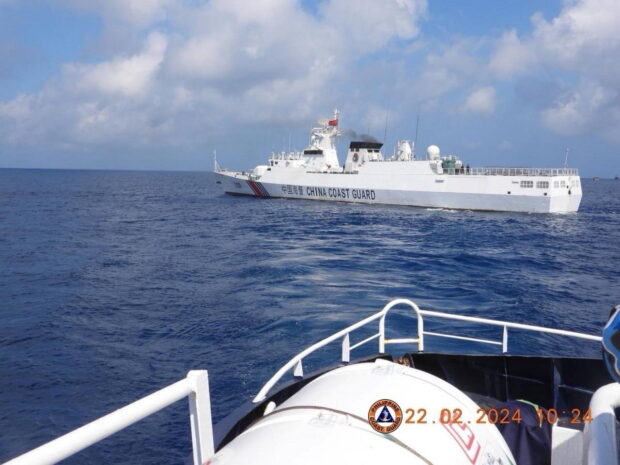Marcos finds China actions in West Philippine Sea getting worrisome

SIGNAL BLOCKED China Coast Guard (CCG) Vessel No. 3105 sails past BRP Datu Sanday of the Bureau of Fisheries and Aquatic Resources on Feb. 22, when the CCG allegedly blocked the Philippine vessel’s signal. —PHOTO COURTESY OF PHILIPPINE COAST GUARD
President Ferdinand Marcos Jr. has expressed worry that the growing presence and assertiveness of China’s forces in the West Philippine Sea (WPS) might further stoke tensions between Manila and Beijing and escalate an already volatile situation in those waters.
“It’s really worrisome. Before, it’s just the China Coast Guard that’s making moves in our area. Now their Navy and fishing boats are joining them, so the situation is really changing,” Mr. Marcos said.
READ: PCG: China jamming tracking signal of PH ships in WPS
The President noted the recent sightings of warships of the People’s Liberation Army-Navy as well as China’s alleged jamming of the automatic identification signals of ships of the Philippine Coast Guard (PCG) and the Bureau of Fisheries and Aquatic Resources (BFAR) near Panatag (Scarborough) Shoal.
But the Chief Executive said the Philippines would continue to defend its sovereign rights to ensure that Filipino fisherfolk can keep making a living in their traditional fishing grounds.
“We just want to enforce what everybody is doing. For us, we will continue, we will just really defend our maritime territory. We continue to support all our fisherfolk who make a living from these fishing grounds and we will continue to help them,” he said shortly before he flew to Australia’s capital of Canberra on Wednesday morning for a two-day state visit.
Unfriendly acts
In an interview with reporters at Villamor Air Base in Pasay City, Mr. Marcos assured Filipino fishers in the West Philippine Sea that the government would defend the country’s maritime territory in spite of the increased presence of Chinese vessels.
Mr. Marcos reiterated his position that the country would not budge an inch despite the unfriendly acts of Chinese vessels, which are known to shadow or block the Philippine government’s ships in the West Philippine Sea, or the waters within the country’s 370-kilometer exclusive economic zone (EEZ) in the South China Sea.
On the President’s orders, the PCG and BFAR began rotational deployments and patrols around Panatag Shoal, also called Bajo de Masinloc, a traditional fishing ground among Filipino fisherfolk.
Over the weekend, the PCG accused China of jamming the tracking signal of PCG and BFAR ships, preventing the vessels from transmitting their positions at sea.
“Despite whatever else happens, if they block us, if they shadow us, we will just continue doing what we are doing. That’s our job, to help fishermen who have been fishing there for generations,” Mr. Marcos said.
“That’s the basic principle there: The fishermen must be allowed to fish in their traditional fishing grounds which belong in the maritime territory of the Philippines,” the President said.
Jamming signals
He made the remarks following the Philippine Navy’s allegation of an increase in interference on the electronic capabilities of Philippine ships deployed on rotation and resupply missions in the West Philippine Sea.
Commodore Roy Vincent Trinidad, Navy spokesperson for the West Philippine Sea, said such “electronic interference,” like the jamming of tracking and communication signals, had been going on for the past three to four years.
However, he could not directly say if China was behind the electronic interference.
The Philippines has filed diplomatic protests against China over a number of maritime incidents, including Chinese ships harassing or blocking Filipino fishers from reaching their fishing grounds, and launching water cannon attacks on Philippine resupply boats headed toward a remote military outpost in Ayungin (Second Thomas) Shoal.
In 2016, an arbitral tribunal in The Hague, the Netherlands, voided China’s sweeping claims in the South China Sea while upholding the Philippines’ sovereign rights to fish and explore resources within its EEZ, a ruling Beijing does not recognize.
Unlike his predecessor Rodrigo Duterte, who cultivated warm ties with China, Mr. Marcos has repeatedly invoked the 2016 Hague ruling.
For comprehensive coverage, in-depth analysis, visit our special page for West Philippine Sea updates. Stay informed with articles, videos, and expert opinions.